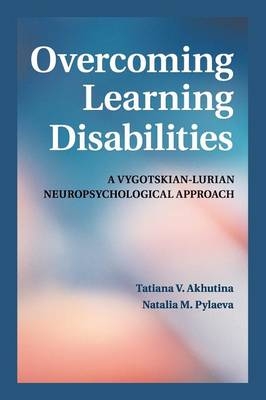
Overcoming Learning Disabilities
Cambridge University Press (Verlag)
978-1-107-53165-9 (ISBN)
Tatiana V. Akhutina is the head of the Laboratory of Neuropsychology at Lomonosov Moscow State University, and head of the Laboratory of Learning Disabilities at Moscow State University of Psychology and Education. She has published in Russian, English, Spanish, Finnish and German. In 2003 the Journal of Russian and East European Psychology dedicated a special issue to her research on psychology of language and neuropsychology. Natalia M. Pylaeva is neuropsychologist at Lomonosov Moscow State University. She is an author of five books on methods of remediation of learning disabilities (together with T. Akhutina). Her articles and books have been translated into English, Finnish, Slovak and Spanish.
Part I. General Issues in Development and Remediation of Higher Mental Functions: 1. Neuropsychology of individual differences in children as the foundation for the application of neuropsychological methods at school; 2. Methodology of neuropsychological intervention in children with uneven development of mental functions; 3. What psychologists, teachers, and parents need to know about children with learning disabilities; 4. Neuropsychological support of remedial and developing education; 5. Neuropsychological approach to development of health preserving educational techniques; Part II. Methods of Development and Remediation of Executive Functions: 6. Organization of joint activity; 7. The 'School of Attention' method - approbation and pilot study of effectiveness; 8. Modified psychological methods to facilitate development of the executive functions; 9. Numerical sequences in the remedial work with the 4th-graders; 10. The role of the analysis of the zone of proximal development in the course of remediation of executive functions: an example; Part III. Methods of Developing Visual-Verbal Functions: 11. Remediation of visual-verbal functions in 5-7 year old children; 12. Perceptual modeling in visual-verbal functions development; Part IV. Methods of Developing Visual-Spatial Functions: 13. Development of visual-spatial functions; 14. 'Construct the figure' methods in assessment and remediation of visual-spatial functions; 15. The use of construction methods to develop spatial functions; 16. Table and computer games to improve spatial functions in children with cerebral palsy; 17. Directions of intervention for developing visual-spatial functions to prepare children for school; 18. Neuropsychologist-teacher collaboration in designing a 'numbers' composition' manual; 19. On visual spatial dysgraphia: neuropsychological analysis and methods of remediation; Part V. Neuropsychological Interventions in Children with Severe Developmental Delay: 20. 'Tracking diagnostics' methods: Case 1. Predominant delay in the development of programming and control functions (unit III); Case 2. Predominant delay in the development of information processing functions (unit II); Case 3. Predominant delay in the development of energy support functions (unit I).
| Zusatzinfo | 10 Tables, unspecified; 138 Halftones, unspecified |
|---|---|
| Verlagsort | Cambridge |
| Sprache | englisch |
| Maße | 152 x 229 mm |
| Gewicht | 470 g |
| Themenwelt | Geisteswissenschaften ► Psychologie ► Allgemeine Psychologie |
| Geisteswissenschaften ► Psychologie ► Entwicklungspsychologie | |
| Geisteswissenschaften ► Psychologie ► Pädagogische Psychologie | |
| Geisteswissenschaften ► Psychologie ► Verhaltenstherapie | |
| Medizin / Pharmazie ► Medizinische Fachgebiete ► Neurologie | |
| Medizin / Pharmazie ► Medizinische Fachgebiete ► Pädiatrie | |
| Sozialwissenschaften ► Pädagogik ► Sonder-, Heil- und Förderpädagogik | |
| ISBN-10 | 1-107-53165-9 / 1107531659 |
| ISBN-13 | 978-1-107-53165-9 / 9781107531659 |
| Zustand | Neuware |
| Haben Sie eine Frage zum Produkt? |
aus dem Bereich


